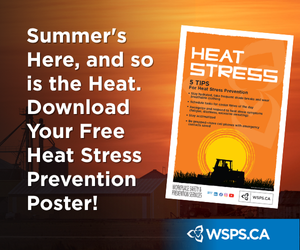Rent, own or lease?
CHOICES IN THE DECISION OF HOW TO ACCESS EQUIPMENT HAVE NEVER BEEN BETTER FOR FARMERS
the choice to rent or buy farm equipment is still a bit of a novelty among Ontario producers. “Up until about a decade ago, your only option was to buy or maybe borrow from a neighbour,” observes Jeff Snowe, a crop farmer in Arthur and the manager of Total Equipment Rental, which has branches in Elmira, Listowel and Acton.
There also used to be resistance to the idea of renting among farmers, but Snowe notes that has changed as well. “There was the attitude that ‘My dad bought and I am going to buy, no matter what the cost,’” he says. “The younger generation of farmers has a different outlook, that if you can’t justify the expense, you shouldn’t do it.” Getting credit is also more of a challenge these days and renting or leasing may be the only option available to some producers.
However, the seasonal nature of farming can make it very difficult to rent, says Keith Stoltz, chair of the board of the Canada East Equipment Dealers’ Association and the financial controller at Stoltz Sales & Service. “There are high demands for certain pieces of equipment at certain peak times of the year,” he says.
fulfilling different needs
Whether to rent or buy can be very simple, according to Snowe. His philosophy is that if you have enough use for a piece of equipment, owning is the way to go. “I set the cut-off at about 300 hours for a tractor,” he says. “If you use it 300 hours or more a year, you should buy it.” Renting is also a no-brainer for special projects such as excavation. “Renting obviously gives you the right tool for the right job,” Snowe notes. It’s also the obvious choice on large farms when an extra tractor is needed temporarily for planting or collecting silage. “It works beautifully to get it all done when the weather’s good, or if there’s a breakdown,” Snowe says. “At our farm of 1,400 acres, we own a lot of our own equipment, but we still rent an extra tractor for a day or two here and there.”
He adds that at Total Equipment Rental, “We also get guys coming who want to try out a piece of equipment without ‘demo-ing’ it. Some guys feel obligated with a demo, and with renting they don’t.”
a third option
There is also the option to lease instead of buying, but this involves a decision much more complex than whether to rent or buy. “Your individual circumstances will play a large factor in making the best decision, and you should consult with your accountant or creditor,” says Larry Batte, an associate at Collins Barrow accounting and consulting firm in Stratford.
One of the most basic things to first understand in making the choice, says Batte, is that the overall expense of a lease versus a purchase of equipment will be very similar over time. “Lease payments are written off, but depreciation and interest is claimed each year if you purchase, and the deductions are basically the same over time,” he notes. Batte adds that the HST on each lease payment and on an equipment purchase (on which you may or may not pay tax), will in both cases be refunded most of the time. “However, you should consider the cash flow issues of having to pay the tax up front while you wait for the refund,” he says.
Farmers should also consider that a lease payment will show up on the income and expense statement, but purchased items show up as an asset and a liability on a balance sheet. Often, a lease is chosen, says Batte, so nothing appears on the liability side of the balance sheet. However, farmers should also be aware that in certain cases, a lease may have to be treated as an operating lease versus a capital lease. “An operating lease will be accounted as an expense, and it may avoid maintenance cost depending on the terms of the contract,” says Bertrand Montel, National Bank Financial Group’s senior agriculture advisor. “Capital leases can be capitalized, and as such are accounted as a liability with interest expenses, but with a different tax treatment from true ownership.”
Contracts involving capital leases for larger assets also require a realistic buy-out at the end of the lease period to qualify as a lease under the Income Tax Act, adds Wayne Ferris, a chartered accountant, farm advisor and farmer near Maxwell. “For farmers who file on a cash basis, balloon payments at the beginning of the lease – only the equivalent of two years included in the balloon payment – may be written off in the year of payment,” he says. After taking into account all considerations, including income tax write offs, interest rate of the lease, availability of financing and more, Ferris, along with his son, Chris who owns Grey Highlands Consulting, recommend doing financial projections for each option. They advise growers to “Plan the work, work the plan and finally, evaluate your results.” •

















